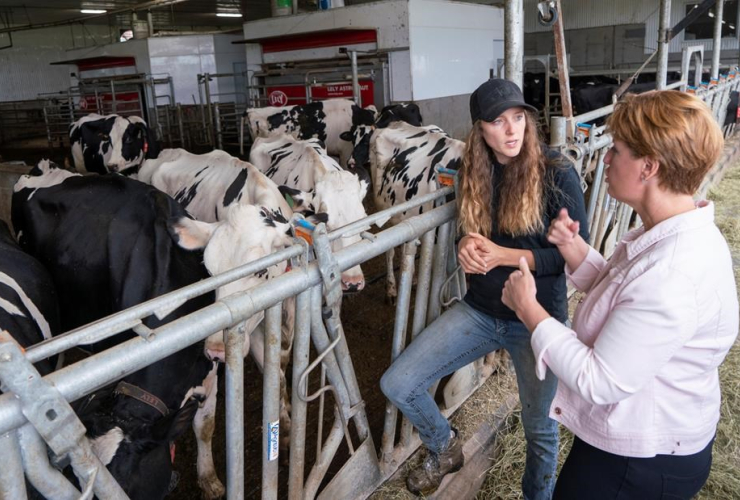For the second month in a row, Prime Minister Justin Trudeau has made a billion-dollar funding announcement for public transit in Quebec, a province whose support he badly needs to maintain power come election time in October.
Following a $1.3 billion-promise in July to extend a Montreal subway line, Trudeau on Monday stood in front of an artist's rendering of a new Quebec City transit system and committed to funding it with $1.2 billion in federal cash.
Trudeau made sure to tell the audience of politicians and journalists his government was "guaranteeing" the money to fund Quebec City's long-awaited project. That's funding, Trudeau said, that his Conservative rival Andrew Scheer isn't ready to commit to.
"Mr. Scheer ... said he opposes this tramway project. I'm not quite sure what that means," Trudeau said.
Opposition leader Scheer has said that if elected, his government's priority would be to fund a so-called "third link" that would offer motorists another way to cross the St. Lawrence River, other than two existing bridges. Scheer has said his government would study a proposed tramway project.
"I think there are questions for Mr. Scheer about his continued commitment to Quebec City and to the excellent project that has been put forward by our partners here," Trudeau said, referring to the tramway.
But while Trudeau may have control over the government purse, Scheer has more members holding Quebec City ridings. The Tory base in the province lies in the Quebec City region, where the Liberals hold only two ridings.
Trudeau's two Quebec City-area members, Families Minister Jean-Yves Duclos and Joel Lightbound, parliamentary secretary to the minister of finance, were both in the room for Monday's announcement. Lightbound has a particularly hard fight ahead of him.
Scheer's Tories have nominated Marie-Josee Guerette, executive vice-president of La Capitale Financial Group, as their star candidate to contest his riding of Louis-Hebert. She has deep roots in the city and is involved in numerous foundations and organizations, including Theatre Le Diamant, run by renowned Quebec stage director Robert Lepage.
Trudeau told reporters he expects to "make gains" in the Quebec City area. "And it's because of everything we've done in the past four years, as well as everything we are going to do together, in the years to come."
Quebec City Mayor Regis Labeaume chose not to wade into the Liberal-Conservative rivalry in his backyard. "That's the beauty of democracy," he said. "If democracy allows us to live critical moments, that let us settle our files, then long live democracy!"
The federal government's investment will help build an expanded public transit network for Quebec City, including a 23-kilometre tramway line. Trudeau said the new network, expected to be built by 2026, will make it easier for residents to get around and will make Quebec City greener.
In addition to the federal contribution, the Quebec government will invest $1.8 billion and the municipal government will contribute $300 million to the project.
Labeaume said the project, which also includes two trambus lines covering 15 kilometres, will mean Quebec City joins the club of Canadian cities with more than 500,000 residents that have modern public transit infrastructure.
In 2017, Trudeau announced another $1.3 billion to fund a new electric rail system for Montreal, known as the REM.
Justin Trudeau -- Doing what
Justin Trudeau -- Doing what good Prime Ministers do, creating jobs by upgrading old and failing or badly needed new infrastructure.
Unlike the CONservative governments and the CONserative leader, Andy Scheer, who will follow Ford's and Kenney's leads and cut programs to the poor and middle class and cut corporate taxes then turn around and ask Ottawa to increase the provincial/federal transfer payments to make up for their cuts.





Comments